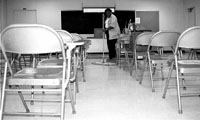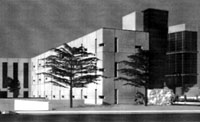By Priya Abraham staff reporter Some liberal arts professors said they are worried that inequities in resources and salaries exist between the M. J. Neeley School of Business and other TCU schools. According to the Fall 1999 TCU Factbook, the average salary for a professor in arts and sciences is $75,628, while a business professor's is $118,880. Gregg Franzwa, a professor of philosophy, said it costs more to run the business school because salaries of business professors are much higher.
Franzwa said treating the university as a corporation causes competition between schools. He said following short-term trends, like a high demand for business degrees, is foolish in the long run. "TCU has, at times, had a kind of mercantile approach to higher education," he said. "If this is any kind of competition, (the humanities) lost." William Koehler, provost and vice chancellor for academic affairs, said the business school is important to TCU's national reputation. "Internally, the school of business is one of our only professional schools," Koehler said. "If your goal is to increase the reputational standing of a university, one of the measures is the ranking of the MBA program. (It) must rank higher than it does." Koehler said moving TCU to the next level involves investing in programs with national promise, he said. "I don't think it's unfair," he said. Nowell Donovan, the Charles B. Moncrief chair of geology, said the business school should be allowed to raise money to increase its ranking, but identifying areas of distinctiveness should not detract from any student's major. "A promise is made to all students that they'll receive an excellent education," he said. "If we're going to take dollars and bang them into the business school at the expense of other programs, then I personally would resist it." Roger Pfaffenberger, a professor of finance and decision science, said entry-level salaries for business professors have escalated recently, particularly because of e-commerce and finance. Since TCU isn't able to meet market salaries, the business school should be able to raise its own endowment through the local business community, Pfaffenberger said.
Meghan Dodson, a sophomore business major, said the business school is more up-to-date than other schools on campus. "It's more real life," she said. "The setup of the building is like a real office building." Linda Moore, chairwoman of the social work department, said the business school is more technologically advanced compared to the humanities and social sciences. She said business is not the only school that could progress faster, though. "The greater fear right now is that the College of Engineering is going to pull resources from humanities and social sciences," Moore said. "It might get business off the hook for a while." Samuel Rose, a sophomore social work major, said the business school has more resources than social work. "The social work department's been in trailers forever," he said.
"You have to do that to receive tenure, and yet you're in a department that can't afford to fund travel," she said. "(In) 11 years at TCU, I've seen a lot of first-rate faculty leave." Linda Hughes, a professor of English, said the university was founded on the liberal arts. "(There's a) fear that the fundamental heritage and tradition of TCU might be neglected (if focus is shifted to non-liberal arts courses)," she said. "The whole university rises or falls on its overall quality."
Priya Abraham
By Reagan Duplisea staff reporter The engineering department is located both in the Bass Building and Sid W. Richardson Building, the computer science department facilities are crowded, and Winton-Scott Hall cannot accommodate instructional technology for the mathematics department, university officials said. But all that should change when the William E. and Jean Jones Tucker Technology Center opens and puts all three departments under one roof. Construction will not begin until the university has raised at least 70 percent of the total building cost - or $17.5 million of the $25 million total cost - said Bronson C. Davis, vice chancellor for university advancement. Davis said his office has raised $14.25 million so far. "This is the largest fund-raising project the university has ever mounted," Davis said.
Although university policy has been not to break ground until all funds have been raised, the Board of Trustees agreed to allow construction to begin with just the 70 percent, Davis said. If administrators wait until all the money is raised, inflation could raise the cost of the building $1 million to $2 million each year construction is delayed. Director of Corporate and Foundation Relations Dennis Alexander said the cost could also increase if they wait because people will want to see more added to it. Davis said the trustees will agree to the 70 percent if the rest of the money has been "identified." This means they know where the money is going to come from, Davis said. The $25 million price tag includes construction, equipment and architect and engineering fees, Provost and Vice Chancellor for Academic Affairs William H. Koehler said. More than $3 million of that is a maintenance and operating endowment. "I'm not sure if it would be the most expensive if you took into consideration inflation over the years," Koehler said. Davis said the project has been challenging for his office because the cost was much more than anticipated. He also said the building was originally planned for just the engineering program and would have cost approximately $7 million. However, when an anticipated grant for engineering buildings fell through because the foundation decided to no longer donate to Texas schools, the building was reconfigured to also include the math and computer science departments. Adding the two departments, plus the office of the dean of the College of Science and Engineering, increased the cost of the building to $25 million, Davis said. Alexander said, "It makes sense to put them in one building so they can share technology and facilities." Davis said another challenge the advancement office has faced is the competition from 35 other financial campaigns in Fort Worth. The museums, the arts and the zoo are among those asking for more than $160 million in funding. Alexander said, "They're really stretching the capacity for philanthropy money." The funds for the center are coming from foundations, technology corporations in the Dallas/Fort Worth area and private individuals, Koehler said. Donations from alumni and the TCU Board of Trustees have also been significant contributions. Koehler said students should not be affected financially. To reach its goal, the advancement office is making a second appeal to the trustees and has several proposals in the works, Davis said. Alexander said the trustees have already donated $3.8 million. "The trustees have put a lot of money into this project from their own pockets," Alexander said. "It's critical because it represents a real significant portion of what we've raised." Alexander said Bess Fish, a private donor, left TCU a large amount of her estate when she passed away several years ago. Part of that was left undesignated, and administrators were able to put that toward the technology center, Alexander said.
Alexander said his office has not done much campaigning among area technology corporations, but there are plans to do so this spring. The technology center will alleviate many of the problems the departments have been having, department heads said. Walt Williamson, chairman of the engineering department, said his department is having problems with space. "Right now, if we had more engineering students show up, I don't know where we'd put them," he said. Williamson also said he expects the engineering faculty to double, and the amount of students in the program to grow from 100 to 250. Koehler said the center will affect other departments on campus as well. After engineering moves out of the Bass Building, the departments of social work and kinesiology may move in.
Reagan Duplisea
By Jaime Walker staff reporter Only months away from graduation, Annie Mason said she was given one of the most valuable opportunities in her college career. She now has the chance to share her efforts with the rest of the student body, as the Interior Design IV renovation proposals for Jarvis Hall went on display in the Student Center this week. "Working on this project really gave me an appreciation not only of the challenges associated with designing a residence hall, but also for all of the people who work night and day to make each model a success," she said. Mason, a senior interior design major, said she and the other 18 students in her class, were given a current floor plan of Jarvis Hall and an overview of their assignment - to transform the hall into an ideal living space for the future. Julianne Rouquette, another senior interior design major, said one of the greatest aspects of the project was the freedom each team had to create its design. "We were given very few limitations," she said. "Whatever we could dream, we could do it, within reason."
"We could knock out walls, create more useful meeting spaces, add balconies and, generally, let our creativity go." Roger Fisher, director of Residential Services, said he had the idea to make last fall's interior design project a residence hall when his department began its major residence hall construction and renovation. "This was a wonderful experience for us and for the students because it gave us a chance to look at the hall with new eyes," he said. "After the students presented their ideas, we began looking at products and concepts differently." Fred Oberkircher, associate professor of interior design, said this class gave his students an opportunity to examine the alternatives of residence hall living. The class got a greater appreciation of what it takes to design a building like Jarvis as well as a respect for the history of TCU, he said. Oberkircher said each design team met with the residence hall architect, engineers and current hall residents to get input for their projects. Mason said such extensive contact with university officials and other students helped improve the quality of the designs. "On this project, we really interacted with those people who would benefit from our work," she said. "We became emotionally involved." Both Rouquette and Mason said they would love to see some of their ideas used in the actual hall renovations. "Seeing a combination of our designs would be a beautiful example of a modern residence hall," Mason said. Fisher said the students were never promised their designs would be used but was impressed with the ideas they came up with. "The final result was fabulous," he said. "We may never know the full impact these students might have on the university." Mason said the work was rewarding not only because the projects turned out well, but also because of the collaboration that took place between the members of the class. "I have such respect for the individual creativity of my classmates," she said. Oberkircher said he had similar pride in his students. "I was blown away by their professionalism and passion for this project," he said. "I want everyone to see the work because people spend so much time complaining about the present that this is a brilliant opportunity to take a look into the future."
Jaime Walker
By Jaime Walker staff reporter The major focus of the House of Student Representatives Open House today will be to raise awareness and money for Robbyn Kindle, the TCU senior awaiting a kidney and small bowel transplant. The event will be held from 11 a.m. to 1 p.m. at the Reed-Sadler mall and is open to all TCU students, faculty and staff. Kindle needs to raise at least $150,000 by Friday. Vice President Sara Donaldson and the other members of the executive board at the House meeting Tuesday said Robbyn Kindle should be a top priority because time is of the essence. "The executive board collectively decided to make our Open House an opportunity for students, faculty and staff to donate money to Robbyn," Donaldson said. "We, as an organization, can do something even better than what was originally planned. We can help a fellow TCU student live." Steven Parker, University Relations chairman, said the Open House will be an opportunity for the students and the Student Government Association to come together to bolster support for Kindle. At the end of the Tuesday night's meeting, Jennifer Jost, chairwoman of the Permanent Improvements Committee fought back emotion to share her feelings about the House efforts. "I can think of no better permanent improvement to this campus than to save a life," she said. Morgan Landry, a sub-chairwoman for Commuter Concerns, said today's event should be a shining example of what it truly means to be a TCU student. "This whole thing really shows me that as Horned Frogs we think it is important to watch out for one another and how special it can be when we take an interest in the life of another Frog," she said.
"This gathering will show people that SGA truly does represent the students and care about them," she said. Kristen Holt, House Parliamentarian, said Robbyn Kindle's story broke her heart because people tend to take life for granted. "We need to do as much as we can as quickly as we can because time is too precious to wait," she said. The SGA is not the only organization taking a serious look at Kindle's situation. People on campus and around the nation are doing what they can to make sure money will be in her account by Friday. Evelyn Roberts, an instructor in nutrition and dietetics who has been personally involved in the effort to raise funds for Kindle, said she has been getting more phone calls than she can keep up with. "I am overwhelmed with the response so far," she said. "I have always known that TCU had a heart, but now they are sharing it with amazing amounts of compassion." Jost said she, too, has seen TCU students show they care about the situation. She said students are arranging a contest between the residence halls to see who can raise the most money. "In Jarvis Hall, we raised $150 in less than 20 minutes," she said. Roberts said she is getting calls from people who heard about Robbyn's story through e-mail or by family at TCU. "Checks are coming from everywhere," she said. "Every dollar is making a difference." SGA President Ben Jenkins said the Open House is just one of the many things going on around campus in support of Kindle. "Robbyn's story hits home for people," he said. "People all over this campus are working to find ways to help her. Student Government is only part of a much larger picture of compassionate people."
Jaime Walker |
| The TCU Daily Skiff © 1998, 1999 Credits |
 "There's a lot of pressure on us to
get better," he said. "At SMU and Baylor, facilities are more
contemporary in terms of supporting excellent programs."
"There's a lot of pressure on us to
get better," he said. "At SMU and Baylor, facilities are more
contemporary in terms of supporting excellent programs." Babette Bohn, an associate professor of
art history, said an unfair financial burden is placed on assistant professors
in her department because of the travel and research required for tenure.
Babette Bohn, an associate professor of
art history, said an unfair financial burden is placed on assistant professors
in her department because of the travel and research required for tenure. If ground breaks on the building this summer according to
plans, it should be finished in 18 to 22 months, administrators said. This
sets the building to open in Spring 2002.
If ground breaks on the building this summer according to
plans, it should be finished in 18 to 22 months, administrators said. This
sets the building to open in Spring 2002.